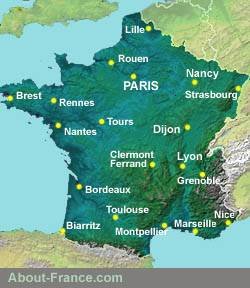
Visiting France - planning a trip
Visiting France -1 The essentials
- ExploreFrance ►
- Key pages
- Where to go
- How to get there
- More about France
SitesearchAbout-France.com
What are you looking for ?
What are you looking for ?
About-France.com -
the connoisseur's guide to France
| On
this
page ► Essential info |
Passport or visa? | France by car | Flying to France |
| Health insurance | Money | Other points |
Onother
pages ► Inmore
detail.....
More vital info to help you prepare the specifics of your trip, such as.....
VisitingParis or other top tourist cities, the French regions, the best of rural France, finding a cottage for hire or a hotel, how to travel round France by car or by train, visiting vineyards, shopping and more generally where to go and what to see in France....
More vital info to help you prepare the specifics of your trip, such as.....
VisitingParis or other top tourist cities, the French regions, the best of rural France, finding a cottage for hire or a hotel, how to travel round France by car or by train, visiting vineyards, shopping and more generally where to go and what to see in France....
First things first:
preparing
your journey

Coronavirus information
(updated for 2026)
Covid restrictions only remain in certain places of risk, such as hospitals, where a mask maybe required. Covid has not gone away; the French government still recommends that people at risk ( over-65s, people with immune deficiency, etc) ensure that their vaccinations are up to date before visiting. .
For more information, see Covid requirements in France
Covid restrictions only remain in certain places of risk, such as hospitals, where a mask maybe required. Covid has not gone away; the French government still recommends that people at risk ( over-65s, people with immune deficiency, etc) ensure that their vaccinations are up to date before visiting. .
For more information, see Covid requirements in France
- Passportor ID card? Citizens of the European Union can travel to France on a national identity card, if they have one. EU citizens who do not have an ID card, and citizens of other countries, must be in possession of a valid passport. Visitors from non-EU countries may need a visa, depending on the length of stay and their country of origin.Visas are not required for citizens holding residence status in any other "Schengen" country, whatever their nationality. For the purposes of a short trip (less than 90 days), visas are not required for visitors from the UnitedStates, Argentina, Australia, Brazil, Chile, Japan, Mexico, United Kingdom, New Zealand,Venezuela and several other countries. For a full list of visa requirements for short or longer stays, visit the official French visa info website in English.
- Travelling
to
France by car:
(Click
here for ► Driving in France). Travellers
coming from the UK: it may be sufficient to just turn up at a ferry
port or the Channel Tunnel, and buy a ticket for the next crossing.
However, this is not advisable in the peak holiday season, or at busy
weekends. Besides, it is often possible to shop around and get a
cheaper
price, if you book in advance. Click here to compare ferry price offers
and book online. Driving to France from most other
neighbouring
countries (Belgium, Luxembourg, Germany, Italy, Spain) is no problem at
all, as customs and border controls have been abolished
within
the Schengen area, and traffic flows seamlessly across these borders.
Customs and passport controls may slow down traffic across borders from
Switzerland, though this is not usually the case. The border crossing
from Andorra can be very slow, if customs decide to check cars for
contraband, notably duty-free cigarettes, as they often do.
Driving license. Drivers from the UK, EU and EEA countries can use their national license in France for up to a year. Drivers with licenses from the USA can also do so, but are recommended to have an IDP too. Drivers from other countries must have a valid national license PLUS either an official translation into French or an IDP (International Drivers Permit) ,which can be obtained ► here. - Reaching
France
by air:
From the UK and Europe. There are more than twenty regional airports in France, with flights from the UK and other countries. For further information, check out the flights to France page. - Flights from North America. The airline
with most direct flights from North America to France is AirFrance
which has direct flights from a dozen or more cities in North America .
For transatlantic passengers, or passengers from
other continents, the general point of arrival in France will be Paris Charles de Gaulle
(CDG) airport. Nice airport is served by Delta from JFK.Geneva airport,
which has flights from the US and Asia, lies on the French-Swiss
border,
and has a direct exit to France. Brussels, Zurich and Luxembourg
airports are also within easy striking distance of France. Check out
options and best value flights online.
For visitors from Canada or NE United States, Air Transat has direct and relatively good value flights from Montreal to Basel-Mulhouse, Bordeaux, Lyon, Marseille, Nantes and Toulouse, as well as Paris.
For flights to France from Australia, Asia-Pacific area and all other long-haul flights to France, consult your travel agency or online ticketing websites for options and prices.
- Currency: France uses the Euro.The easiest way to get holiday money (and often the cheapest) is to withdraw euros from an ATM (hole in the wall, cash dispenser) on arrival in France, or even from a Euro dispenser in the departure area at a major UK airport. Most French ATMs accept foreign cards (Visa, Mastercard, Maestro, etc). (See page on Banks and paying for things in France). Note: If your bank / creditcard account is not in Euros, you will pay a commission on each transaction – withdrawal or payment. Commissions are proportionally greater the smaller the transaction, so it is not advisable to use your card regularly for a lot of small transactions. You will pay less (maybe quite a bit less) by withdrawing enough cash for a day or two from an ATM, then paying in cash.
- Health: visitors are strongly advised to make sure that they have health insurance cover before travelling to France or any other foreign country. For France, UK visitors should obtain the Global Health Insurance Card (GHIC), which has replaced the old EHIC form but provides just the same cover; further details on the About-France.com health cover in France page.
Other points
Findhotelsin
France

Clickfor bestonline rates for hotels inFrench towns and cities.
Calais
Paris
Reims
Dijon
Beaune
Lyon
Rouen
Orleans
Tours
Poitiers
Bordeaux
Montpellier Nice Clermont-Fd.

Clickfor bestonline rates for hotels inFrench towns and cities.
Paris
Reims
Dijon
Beaune
Lyon
Rouen
Orleans
Tours
Poitiers
Bordeaux
Montpellier Nice Clermont-Fd.
About-France.com
is
partnered with Europe's
leading hotel booking portal, Booking.com, tobring you the best
online prices
- Accommodationand
hotels :
There are hundreds of internet sites offering direct booking for hotels, but beware of sites supposedly offering the "cheapest deals". Check out afew sites before you book. Visit the hotels page for information on French hotels, else our information on Paris hotels, or the interactive holiday rentals maps on Gitelink.com for information on renting acottage, or bed and breakfast.
- Paying
in
advance; gites, small hotels, campsites. If you need
to make a deposit for accommodation, some premises will accept
credit cards or Paypal; but for those that do not, it is usually
possible to make an "IBAN" transfer (also known as an electronic funds
transfer), which is quite simple and not expensive. Ask your bank for
details.
- Drivingin
France : Technically, if you are driving a car registered
in another European Union country, you do notneed
a green card (international insurance card) to travel to Europe,just
your national car insurance certificate. However, it may well bethat
your standard national insurance only provides you withthird-party
cover once abroad; check with your insurer. Extracomprehensive cover
can be obtained from your normal insurer, or froman outside source such
as the AA. Clickhere for
more information about driving
and motorways in France or on driving south from Calais
- Mobile phones / cellphones:if you want to continue using your national mobile phone while abroad, you may need to enable international use by contacting your operator. Since Brexit, many UK phone operators have reintroduced roaming charges; consult your operator for details. See more details for using US cellphones in France.
- When to visit
France : The best times of year are, of course, between
April and October: July and August tend to be very busy in most tourist
areas. The Spring and the Early
Autumn are agreat time to visit France, if you are not bound
by the requirements of school term dates or work.
Climate change: with summer heatwaves increasingly common in the south of France, there is an upsurge in spring and autumn tourism among those who are not bound by school holiday calendars. The tourist industry is fast adapting to cater for them, with sites and restaurants extending their summer season until the end of September, or even later. - For day trips to France from the UK compare the options available.
Continue now with part 2 : Choosing a holiday
Holiday
travel
insurance:
It is highly recommended, and in some cases obligatory, to be insured when you travel. Many people have existing policies, or even credit cards, that include travel insurance, but it is always a good idea to check. Make sure that you have accident and emergency cover, including civil third party liability cover (for humans, as well as yourcar).
It is particularly important and usually necessary to take out special insurance if you plan to do anything out-of-the-ordinary while on holiday, such as winter-sports or other types of sport.
It is highly recommended, and in some cases obligatory, to be insured when you travel. Many people have existing policies, or even credit cards, that include travel insurance, but it is always a good idea to check. Make sure that you have accident and emergency cover, including civil third party liability cover (for humans, as well as yourcar).
It is particularly important and usually necessary to take out special insurance if you plan to do anything out-of-the-ordinary while on holiday, such as winter-sports or other types of sport.

Practical
information
pages designed to help you prepare your holiday in
France, decide when and where to go, what to take with you, where to
stay and how to get there
Planninga
trip to France.
Other useful pages.
Other useful pages.
- Holiday week planner
- Public holidays in France
- French school holiday calendars 2025
- Climate and weather
- Preparing your trip (thispage)
- Choosing a type of holiday
- A weekend in France - 10 ideas
- The most interesting cities
- Franceon a limited budget
- Cheaptravel offers
- Travel to France and getting round France
- Driving in France
- Is France safe ?
►► More topics on French life
Anindependent
user-supposted website, About-France.com is an affiliate partner
of carefully selected relevant third-party websites, and may receive a
small commission on some transactions made on these partner sites.

► Moreaccommodation
Guide to hotels in FranceBed and breakfast in France
Rural campsites in France
Independent hotels in France
